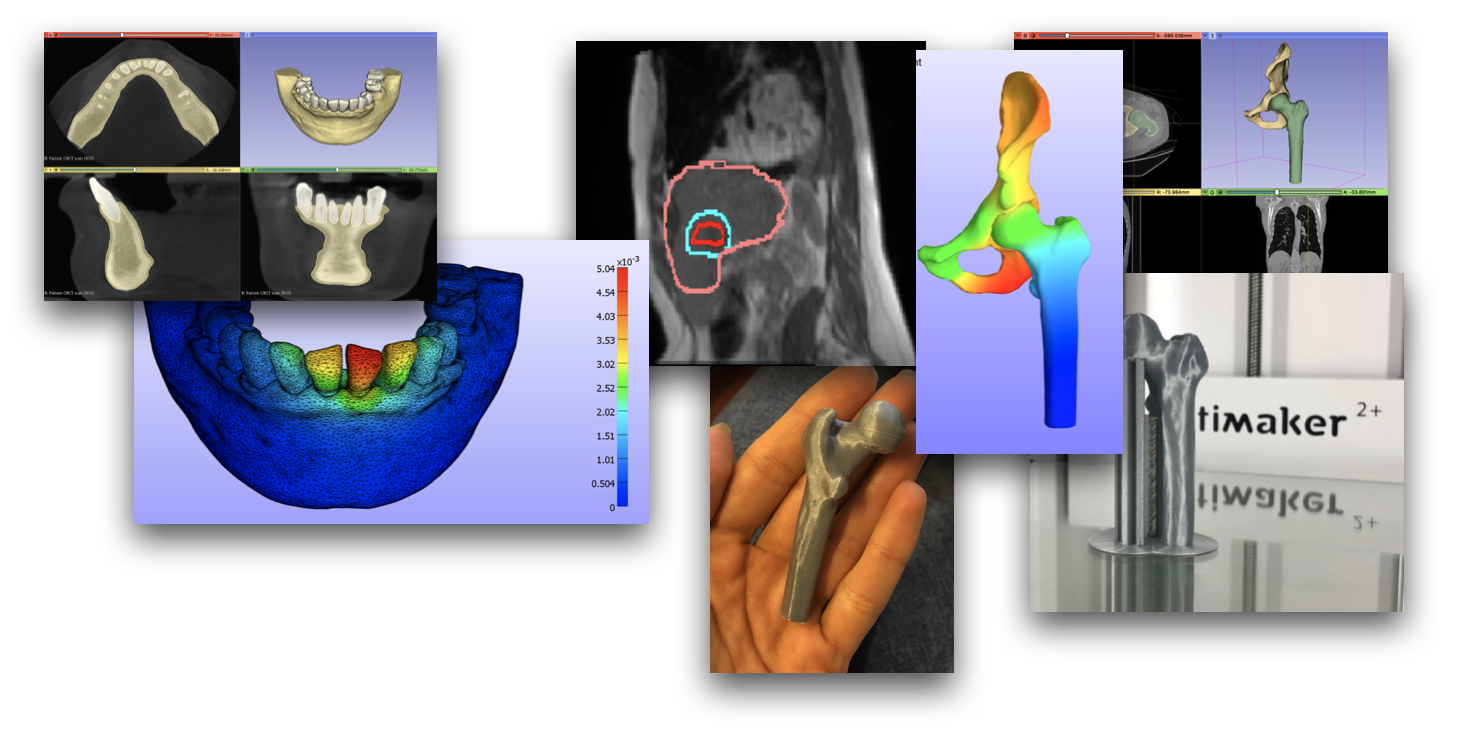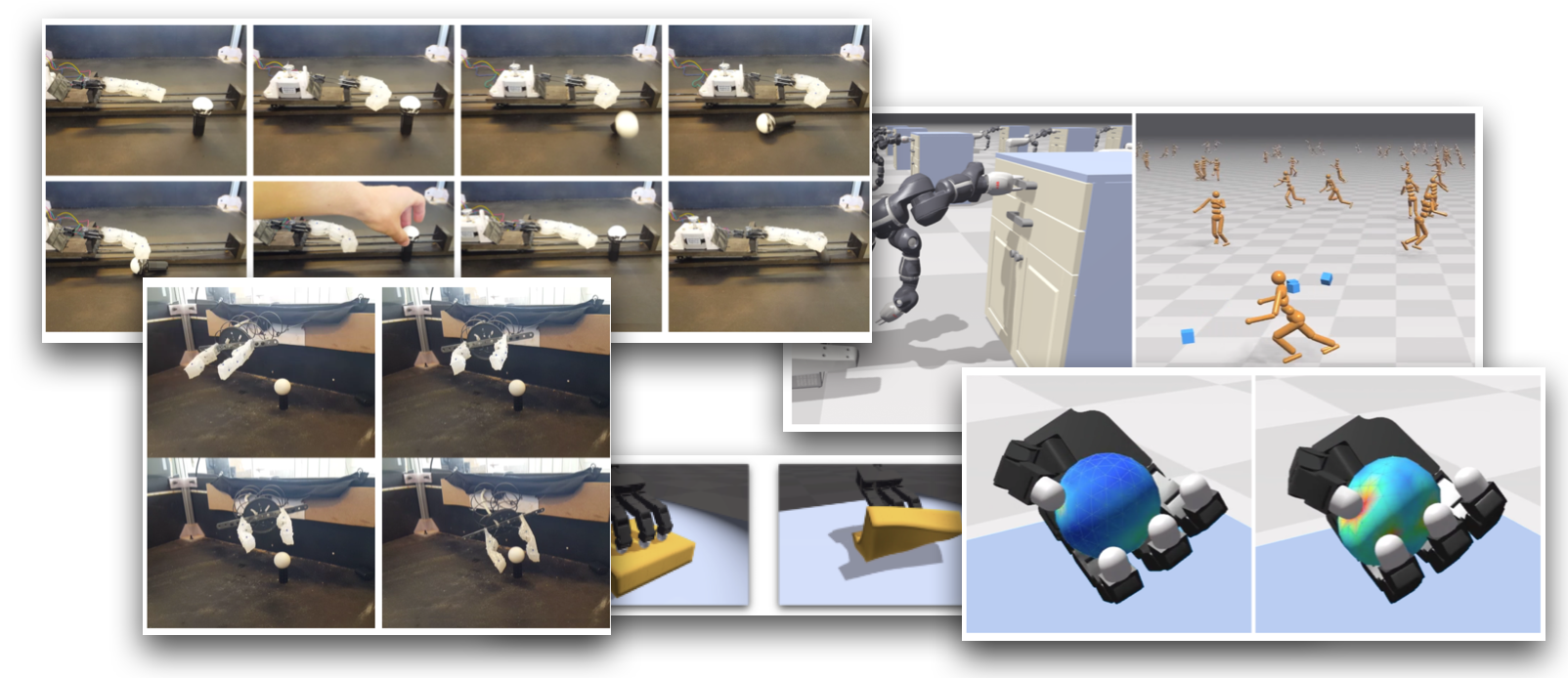Rapid Biomechanics Simulation for Personalized Clinical Design (RAINBOW) is a 'Marie Sklodowska-Curie European Training Network' dedicated to training 15 PhD fellows in scientific skills and transferrable skills, enabling them to take up careers in the academic as well as in the non-academic sectors.
Computer Graphics & Simulation

Our research focus is mainly related to applications in personalized health-care, digital prototyping, modeling of mechanical systems, computer games, and robotics. Our work combines advanced mathematical modeling with data-driven approaches, physics and numerical methods. We have a wide range of expertise in numerical solutions of partial differential equations, numerical optimization, computational meshing, geometry processing and more.

We work mainly with biomechanical modeling of humans for clinical design. Applications are for decision support systems for prognosis and diagnose of various pathologies as well as systems for progress monitoring for surgical decisions or rehabilitation, and surgical training. Our research topics cover advanced tissue modeling using finite element techniques, statistical models for shape and growth variation, kinematical models of human motion, patient-specific modeling and other topics. We are the coordinator and main PI on the European MSC-ITN RAINBOW, Rapid Biomechanical Modeling for Personalized Clinical Design and we collaborate with companies such as Kitware, 3Shape, Anybody ApS and more.

Our focus is on robotics simulation and how it can be used for artificial intelligence (AI). We work on soft robots combined with depth range and computer vision systems. Our focus is on creating high fidelity simulators that are extremely computationally efficient. Our research core is on developing novel numerical methods that are highly efficient and exploit modern parallel hardware and on the modeling of constitutive equations such as friction models and stress-strain relationships. Our vision is to make simulation models more data-driven to enable simulators to better bridge the reality gap. We have an ongoing collaboration with NVIDIA working on the FleX simulator, and an MSC-IF EMISSIR project working with multi-level methods.

A large area of focus is on macroscopic friction modeling for simulation of mechanical systems. Applications are a risk assessment of jamming in hoppers or part feeders or similar mechanical systems, robots grasping objects or other kinds of interaction with the environment, and computational fabrication of designed surfaces. Our research involves deriving new novel mathematical models for various frictional effects for various materials such as anisotropic and very stiff materials. The models are derived from micro-scale simulations, or from data-driven approaches where we design measurement equipment and collect data to inspire new models, or from tribology theory about friction models. The focus is fundamental and covers basic research activities in collaboration with other researchers around the world. Examples of our work can be found on our blog.

We have a strong and long-term collaboration with the Alexandra Institute. Through joint positions and projects, we seek to innovate and apply our research in industry. For instance, we have a long-term project on character animation with IO-Interactive and Alexandra Institute. In this work, we supervise industrial PhDs and provide the project with knowledge and experience in frontier research results and skills in solving problems with a scientific approach. We are involved in the national academy of digital interactive entertainment, DADIU. Preparing the next generation of game programmers to use more data-driven models and methods in game production.
Selected Research Results
-

Local Optimization for Robust Signed Distance Field Collision
2020.05.11
-

The Matchstick Model for Anisotropic Friction Cones
2019.11.06
-

High fidelity simulation of corotational linear FEM for incompressible materials
2019.10.28
-

Non-Smooth Newton Methods for Deformable Multi-Body Dynamics
2019.08.01
-

Automated Acquisition of Anisotropic Friction
2019.05.29
-

Data Driven Inverse Kinematics of Soft Robots using Local Models
2019.05.20
Contact
 Kenny Erleben
Kenny Erleben
Associate Professor
kenny@di.ku.dk
Participants
Sune Darkner, Associate Professor
Renfei Liu, PhD Student
Faezeh Moshfeghifar, PhD Student
Torkan Gholamalizadeh, PhD Student
Thomas Michael Alscher, PhD Student
José David Tascón, PhD Student
Magnus Koch, PhD Student
Max Kragballe Nielsen, PhD Student
Paul Schreiner, PhD Student
Peidi Xu, PhD Student
Xiang Dai, PhD Student
Alumni
Mihai Francu, Post Doc
Susanne Claus, Post Doc
Sarah Niebe, Post Doc
Morten Engell Nørregård, PhD
Open Source Projects
OpenTissue (c++, CG, a generic library for simulation and animation, fluids, rigid bodies, deformable, inverse kinematics and more)
PROX Matchstick (c++, rigid body simulation, anisotropic friction)
GRIT (c++, moving interface meshing)
CHUNKED_BVH (c++, openCL, collision detection)
pySoRo (python, depth sensors & robotic control)
HessianIK (python, Matlab, inverse kinematics)
Num4LCP (Matlab, python, Cuda LCP solvers)
hyper-sim (Matlab, hyper-elastic FVM, FEM)
FOAM (python, 2D dry foam simulations)
